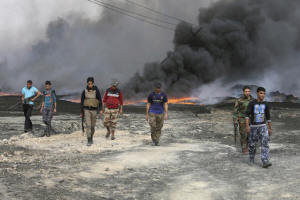|
Iraqi forces advance on town where
Islamic State accused of executing prisoners
 Send a link to a friend
Send a link to a friend
 [November 02, 2016]
By Maher Chmaytelli and Stephen Kalin [November 02, 2016]
By Maher Chmaytelli and Stephen Kalin
BAGHDAD/BARTELLA, Iraq (Reuters) -
U.S.-backed Iraqi forces moved closer on Wednesday to a town south of
Mosul where aid groups and regional officials say Islamic State has
executed dozens of prisoners.
A military statement said security forces advanced to the edge of Hammam
al-Alil, a thermal water resort, after an elite unit breached the
eastern limits of Mosul, the ultra-hardline group's last major city
stronghold in Iraq.
The battle that started on Oct. 17 with air and ground support from a
U.S.-led coalition is shaping up as the largest in Iraq since the
U.S.-led invasion of 2003.
Mosul still has a population of 1.5 million people, much more than any
of the other cities captured by IS two years ago in Iraq and neighboring
Syria.
The United Nations cited reports on Tuesday that Islamic State, which is
also known as ISIL, is attempting to displace Hammam al-Alil's estimated
population of 25,000 for use as human shields and protection against air
and artillery strikes.

"We have grave concerns for the safety of these and the tens of
thousands of other civilians who have reportedly been forcibly relocated
by ISIL in the past two weeks," U.N. human rights spokeswoman Ravina
Shamdasani said.
The town, 15 km (9 miles) south of Mosul, had a pre-war population of
65,000, a local official said.
Aid organizations, local officials and Mosul residents have cited
reports that IS has executed dozens of people in Hammam al-Alil and
barracks nearby on suspicion of planning rebellions in and around Mosul
to aid the advancing troops.
Abdul Rahman al-Waggaa, a member of the Nineveh provincial council, told
Reuters last week that most of the victims were former police and army
members. The men were shot dead, he said, quoting the testimony of
remaining residents of the villages and people displaced from the area.
FEARS OF A HUMANITARIAN CRISIS
The U.N has said the Mosul offensive could trigger a humanitarian crisis
and a possible refugee exodus if the civilians inside in Mosul seek to
escape, with up to 1 million people fleeing in a worst-case scenario.
The International Organisation for Migration said nearly 21,000 people
have been displaced since the start of the campaign, excluding thousands
of villagers taken into Mosul by retreating jihadists who used them as
human shields.
Elite Counter Terrorism Service (CTS) troops were the first
to breach Mosul's official boundary this week. They said on Tuesday they
were in control of the state television station.
[to top of second column] |

Tribal fighters walk as fire and smoke rises from oil wells, set
ablaze by Islamic State militants before IS militants fled the
oil-producing region of Qayyara, Iraq. REUTERS/Alaa Al-Marjani

A CTS commander, Lt. General Abdul Ghani al-Assadi told reporters in
Bartella, a village west of Mosul, that the unit will pause its advance
on the eastern front because of bad weather.
"God willing the next stage will begin within hours. This depends on the
weather," he said.
A curfew had been imposed on the recaptured eastern suburb of Kokjali,
he said, to protect residents from mortar bombs fired by the insurgents.
Kurdish Peshmerga fighters are also deployed on the eastern and northern
fronts, and Iranian-backed Iraqi Shi'ite militias are attacking Islamic
State west of Mosul.
The involvement of pro-Iranian militias is causing alarm in Turkey which
has had troops deployed north of the city since last year to train and
support Sunni Arab volunteers who also want to take part in the battle.
Turkey's army has begun deploying tanks and other armored vehicles to
the town of Silopi near the Iraqi border. Turkish Defence Minister Fikri
Isik said on Tuesday the move was related to the fight against terrorism
and developments across the border.
Turkey says it has a responsibility to protect ethnic Turkmens and Sunni
Arabs in the area around Mosul, once part of the Ottoman Empire. It
fears both PKK militants and Shi'ite militias, which the Iraqi army has
relied on in the past, will be used in the campaign and stoke ethnic
bloodletting.

Iraqi Prime Minister Haider al-Abadi told a news conference after a
cabinet session in Baghdad on Tuesday that tensions with Turkey have
eased in the last week, but warned that Iraq would respond to any
"violation" of its territory.
(Additional reporting by Ahmed Rasheed, Editing by Timothy Heritage)
[© 2016 Thomson Reuters. All rights
reserved.]
Copyright 2016 Reuters. All rights reserved. This material may not be published,
broadcast, rewritten or redistributed. |